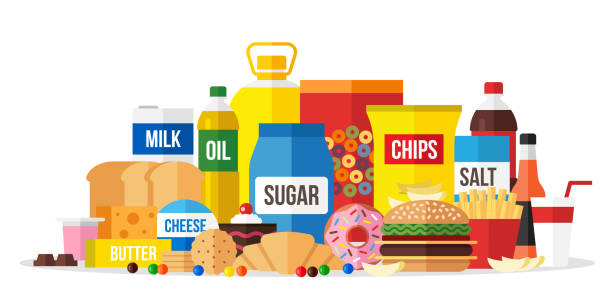What are saturated fatty acids?
Saturated fatty acids are a category of fatty acids present in dietary fats. They are called “saturated” because each carbon in their chain is bonded to hydrogen atoms, making them “saturated” with hydrogen.
Which foods contain saturated fats?
Foods containing saturated fats are primarily of animal origin, although some vegetable oils also contain them in smaller amounts. Here is a list of the main foods high in saturated fats:
1. Fatty meats: lamb, pork, beef (especially fatty cuts), lamb chops, ribeye steaks, pork ribs, sausages, bacon, etc.
2. Dairy products: butter, cheese (especially high-fat varieties like cheddar, camembert, etc.), heavy cream, ice cream, whole milk.
3. Animal fats: lard, duck fat, beef fat.
4. Tropical oils: coconut oil and palm oil.
5. Processed and fast food: hamburgers, chicken nuggets, pizzas, french fries, fried dishes, etc.
6. Organ meats: liver, kidneys, brains, etc.
7. Certain poultry: chicken skin, duck, and goose.
8. Chocolate: Both dark chocolate and milk chocolate contain saturated fats.
It is important to note that many foods contain a combination of saturated, monounsaturated, and polyunsaturated fatty acids. Saturated fats should not be completely excluded from your diet, but their consumption should be moderated to maintain a balanced diet that is beneficial for cardiovascular health. It is recommended to prioritize sources of unsaturated fatty acids, such as nuts, seeds, avocados, and vegetable oils.
Recommended daily intake
The recommended daily intake of saturated fatty acids varies based on specific guidelines from each organization, but in general, the following values can be considered:
1. The World Health Organization (WHO) recommends limiting the intake of saturated fatty acids to less than 10% of total energy intake. This means that if you follow a 2000-calorie diet per day, the intake of saturated fatty acids should not exceed 20 grams per day (2000 calories x 10% / 9 calories per gram).
2. Health authorities in some countries, such as the United States (US Dietary Guidelines), have recommended a slightly lower limit, around 7 to 10% of total energy intake.
These recommendations aim to maintain good cardiovascular health by reducing LDL cholesterol (bad cholesterol) levels in the blood, which can help prevent heart diseases.
Are saturated fatty acids good or bad for health?
Excessive consumption of saturated fatty acids is associated with an increased risk of cardiovascular diseases and other health problems. However, they are necessary in small amounts for certain bodily functions.
Several epidemiological studies have shown that diets high in saturated fatty acids increase LDL cholesterol levels in the blood, thereby increasing the risk of heart diseases. Studies also suggest an association between high intake of saturated fatty acids and type 2 diabetes.
It is important to note that many foods contain a combination of saturated, monounsaturated, and polyunsaturated fatty acids. Saturated fats should not be completely excluded from your diet, but their consumption should be moderated to maintain a balanced diet that is beneficial for cardiovascular health. It is recommended to prioritize sources of unsaturated fatty acids, such as nuts, seeds, avocados, and vegetable oils.
Recommendations on saturated fatty acids
1. Limit the consumption of foods high in saturated fats, such as fatty meats, full-fat dairy products, and fried foods.
2. Prefer unsaturated fatty acids, such as those found in avocados, nuts, seeds, and vegetable oils (olive oil, canola oil).
3. Opt for lean meats and low-fat dairy products.
4. Avoid snacks high in saturated fats, such as chips and cookies.
5. Cook with healthier cooking methods, such as baking, steaming, or using minimal oil for frying.
6. Read food labels carefully and choose products with low saturated fat content.
7. Diversify your diet by including a wide variety of healthy foods.
8. Consume fatty fish rich in omega-3 fatty acids, such as salmon and sardines, for heart-healthy benefits.
9. Reduce your consumption of fast food and processed dishes, as they are often high in saturated fats.
10. Prefer skim milk or low-fat plant-based alternatives over whole milk.
11. Avoid oils high in saturated fats, such as palm oil and coconut oil, whenever possible.
12. Incorporate vegetables, fruits, and whole grains into your diet to increase your fiber and antioxidant intake.
13. Decrease your consumption of processed products high in saturated fats, such as biscuits, cakes, and pastries.
14. Choose cooking methods that do not add saturated fats, such as steaming or grilling.
15. If you have concerns about cholesterol or other cardiovascular risk factors, consult a healthcare professional for personalized recommendations.
In conclusion
Saturated fatty acids are fats found primarily in animal fats and certain vegetable oils. While we need small amounts of saturated fatty acids for certain bodily functions, excessive consumption can be harmful to cardiovascular health. It is essential to limit the consumption of foods high in saturated fats and prioritize unsaturated fatty acids to maintain a balanced diet that is beneficial for overall health. If you have specific concerns about your diet, it is always best to consult a healthcare professional for advice tailored to your situation.
Remember that maintaining a healthy diet and lifestyle is crucial for promoting good health and reducing the risk of chronic diseases. Be mindful of your food choices and aim to incorporate a variety of nutritious foods into your daily meals.


